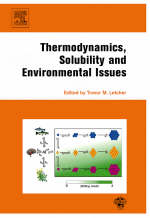
Thermodynamics, Solubility and Environmental Issues
Elsevier Science Ltd (Verlag)
978-0-444-52707-3 (ISBN)
Environmental problems are becoming an important aspect of our lives as industries grow apace with populations throughout the world. Thermodynamics, Solubility and Environmental Issues highlights some of the problems and shows how chemistry can help to reduce these them. The unifying theme is Solubility – the most basic and important of thermodynamic properties. This informative book looks at the importance and applications of solubility and thermodynamics, in understanding and in reducing chemical pollution in the environment.
Written by experts in their respective fields and representing the latest findings in this very important and broad area. A collection of twenty-five chapters cover a wide range of topics including; mining, polymer manufacture and applications, radioactive wastes, industries in general, agro-chemicals, soil pollution and biology, together with the basic theory and recent developments in the modelling of environmental pollutants.
Professor Trevor Letcher is an Emeritus Professor at the University of KwaZulu-Natal, South Africa, and living in the United Kingdom. He was previously Professor of Chemistry, and Head of Department, at the University of the Witwatersrand, Rhodes University, and Natal, in South Africa (1969-2004). He has published over 300 papers on areas such as chemical thermodynamic and waste from landfill in peer reviewed journals, and 100 papers in popular science and education journals. Prof. Letcher has edited and/or written 32 major books, of which 22 were published by Elsevier, on topics ranging from future energy, climate change, storing energy, waste, tyre waste and recycling, wind energy, solar energy, managing global warming, plastic waste, renewable energy, and environmental disasters. He has been awarded gold medals by the South African Institute of Chemistry and the South African Association for the Advancement of Science, and the Journal of Chemical Thermodynamics honoured him with a Festschrift in 2018. He is a life member of both the Royal Society of Chemistry (London) and the South African Institute of Chemistry. He is on the editorial board of the Journal of Chemical Thermodynamics, and is a Director of the Board of the International Association of Chemical Thermodynamics since 2002.
Basic Theory and Modelling
Chapter 1: An introduction to modelling of pollutants in the environment (T.M. Letcher).
Chapter 2: Modelling the solubility in water of environmentally important organic compounds
(E. Estrada et al.).
Chapter 3: Modeling of contaminant leaching (M. Diaz, D. Apul).
Industry and Mining
Chapter 4: Supercritical fluids and reductions in environmental pollution (K. Yamanaka, H. Ohtaki).
Chapter 5: Phase equilibrium studies on ionic liquid systems for industrial separation processes of complex organic mixtures (P. Reddy, T.M. Letcher).
Chapter 6: Environmental and solubility issues related to novel corrosion control (W.J. van Ooij, P. Puomi).
Chapter 7: The behaviour of iron and aluminum in acid mine drainage: speciation, mineralogy, and environmental significance (J.S. España).
Radioactive Wastes
Chapter 8: An evaluation of solubility limits on maximum uranium concentrations in groundwater (T. Iwatsuki, R.C. Arthur).
Chapter 9 : Leaching from cementitious materials used in radioactive waste disposal sites (K. Yokozeki).
Air, Water, Soil and Remediation
Chapter 10: Solubility of carbon dioxide in natural systems (J. Salminen et al.).
Chapter 11: Estimation of the volatilization of organic chemicals from soil (E. Voutsas).
Chapter 12: Solubility and the phytoextraction of arsenic from soils by two different fern species
(V. Campos).
Chapter 13: Environmental issues of gasoline additives – aqueous solubility and spills (J. Bergendahl).
Chapter 14: Ecotoxicity of ionic liquids in an aquatic environment (D. Pieraccini et al.).
Chapter 15: Rhamnolipid biosurfactants: solubility and environmental issues (C.N. Mulligan).
Chapter 16: Sorption, lipophilicity and partitioning phenomena of ionic liquids in environmental systems (P. Stepnowski).
Chapter 17: The solubility of hydroxyaluminosilicates and the biological availability of aluminium (C. Exley).
Chapter 18: Apatite group minerals: solubility and environmental remediation (M.C.F. Magalhães, P.A. Williams).
Polymer Related Issues
Chapter 19: Solubility of gases and vapors in polylactide polymers (R.A. Auras).
Chapter 20: Biodegradable material obtained from renewable resource : plasticized sodium caseinate films (J-L. Audic et al.).
Chapter 21: Supercritical carbon dioxide as a green solvent for polymer synthesis (C.D. Wood et al.).
Chapter 22: Solubility of plasticizers, polymers and environmental pollution (E. Białecka–Florjańczyk, Z. Florjańczyk).
Pesticides and Pollution Exposure in Humans
Chapter 23: Solubility issues in environmental pollution (A. Arce, A. Soto).
Chapter 24: Hazard identification and human exposure to pesticides (A. Garrido Frenich et al.).
Chapter 25: Solubility and body fluids (E. Königsberger, LC Königsberger).
| Erscheint lt. Verlag | 20.4.2007 |
|---|---|
| Verlagsort | Oxford |
| Sprache | englisch |
| Maße | 165 x 240 mm |
| Gewicht | 1060 g |
| Themenwelt | Naturwissenschaften ► Biologie ► Ökologie / Naturschutz |
| Naturwissenschaften ► Chemie ► Physikalische Chemie | |
| ISBN-10 | 0-444-52707-9 / 0444527079 |
| ISBN-13 | 978-0-444-52707-3 / 9780444527073 |
| Zustand | Neuware |
| Informationen gemäß Produktsicherheitsverordnung (GPSR) | |
| Haben Sie eine Frage zum Produkt? |
aus dem Bereich


